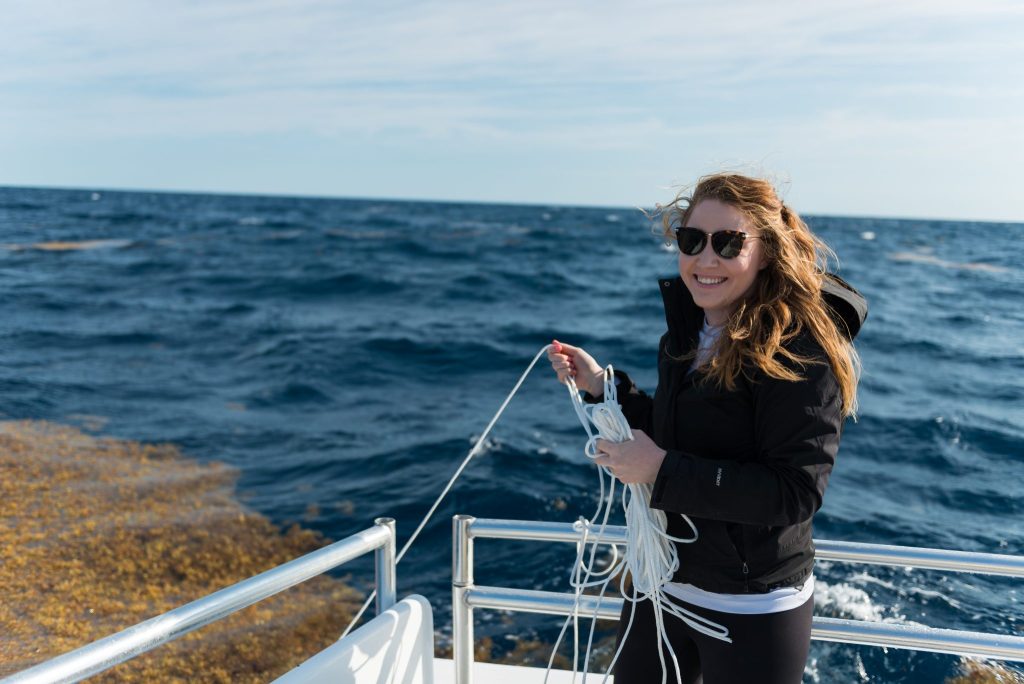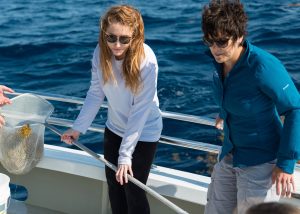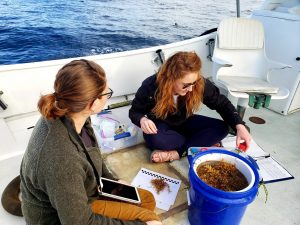Former field site student awarded prestigious NSF Fellowship
August 2, 2020
Claire Johnson, a student in the University of North Carolina at Chapel Hill’s Environment, Ecology and Energy Program (E3P) and former IE field site student, recently was awarded a competitive Graduate Research Fellowship from the National Science Foundation (NSF). The award includes $138,000 to continue her educational pursuits and provides three years of tuition and fee funding, additional stipends and opportunities for professional development. She will be using the fellowship to complete her doctoral degree in the E3P program at the Coastal Studies Institute (East Carolina University Outer Banks Campus) in Wanchese, NC, which is also home to UNC’s Outer Banks Field Site.
Johnson’s research focuses on rates of nitrogen fixation by cyanobacteria living on Sargassum, an unrooted plant that floats at the ocean’s surface.
Studying this process is important for several reasons. While transforming, or fixing, nitrogen into a usable form is an incredibly energy-intensive process, it is also very leaky. Though the reasons behind this “leakiness” are still unclear, the implications are profound. Organisms living in close proximity to nitrogen-fixing cyanobacteria can scavenge and incorporate this essential nutrient into their own cells, thereby benefitting from this reactive nitrogen input. In a nitrogen-limited environment, any increase in available nitrogen will, theoretically, increase primary production, resulting in carbon draw-downs.
Johnson applied for the NSF fellowship last fall. She strategized with Lindsay Dubbs, her current Ph.D. advisor and former undergraduate professor, and Michael Piehler, director of UNC’s Institute for the Environment and former interim executive director of the Coastal Studies Institute, to ensure the best possible outcome. Students can apply before they even begin graduate school, but Johnson wanted to wait until she had completed a year of her program.
“I wanted to make sure that I had the most understanding and a more holistic view of exactly what I wanted and a clearer picture of the research that I wanted to present for this,” Johnson said. “So, that’s why I waited a little bit longer, but it was a really intense I would say 3 months or so of writing, reviewing, editing, rewriting, etc. to get my application to the point where I felt like it was ready to submit.”
Dubbs, who has appointments at the Institute for the Environment and the Coastal Studies Institute at East Carolina University (ECU), knows Johnson well. She is also the co-director of UNC’s Outer Banks Field Site, where Johnson studied her senior year as an undergraduate.
The Outer Banks Field Site is a partnership between ECU’s Coastal Studies Institute and UNC’s Institute for the Environment, Study Abroad and the E3P programs. For the last 20 years, the program has provided opportunities for students to gain field experience with a focus on interdisciplinary research.
While at the field site, Johnson and two of her classmates expanded their original quantitative research plan to include a laboratory-based filtration study where they measured the rates at which different configurations of oysters filtered algae from the water column.
After graduation, Dubbs hired Johnson as a research technician.
“She’s someone who’s learning not just to check the box. She seeks knowledge, finds things interesting, studies them very rigorously, and asks really good questions,” Dubbs said. “She’s also a very kind and empathetic person. She’s pretty much become part of my family as well as my student. When she’s not at home for holidays, like Halloween, she joins us and goes trick or treating with my family, for instance.”
As a research technician, Johnson worked on the North Carolina Renewable Ocean Energy Program (NCROEP) characterizing the ecology and environment of the Gulf Stream off the coast of Cape Hatteras, NC. With the encouragement of Dubbs, she applied to graduate school to pursue her interest in nitrogen fixation by Sargassum.
Johnson was always interested in science, but she didn’t always see it as a career path.
“I just thought of it more as a hobby,” Johnson said. “ I always loved watching nature documentaries and stuff like that growing up. Those are the kinds of books I would bring to school and present book reports on, science books, not novels like other kids did.”
While attending UNC as an undergraduate, Johnson rediscovered her love for science and majored in environmental studies and geography.
For her fellowship application, Johnson had to write a personal statement detailing her journey into her area of interest and a second statement about her research. After a bad experience in an advanced placement high school science class, she decided to pursue other interests when she entered her freshman year at UNC.
Originally a history major with a concentration in medieval studies, she decided to reevaluate her choices after her first year.
“I really thought about ‘What do I like doing? It’s not what I think would be best for a career. What do I actually enjoy doing?’” Johnson said. “And I remember looking through the course catalog that they give you at orientation and looking at all of the science and environmental studies classes and thinking that all of these really piqued my interest, and I think I would enjoy doing that the most. So, I decided to nix everything I’d signed up for and start with the environmental studies, and I really enjoyed it.”
Johnson majored in environmental studies and took Coral Reef Ecology & Management, which was taught by professor Greg Gangi. The class included a trip to St. John in the U.S. Virgin Islands during spring break of her sophomore year. She said this served as her introduction to marine ecology. After studying at the Outer Banks Field Site and later working at the Coastal Studies Institute, she became fascinated by the nitrogen fixation research Dubbs was performing.
Johnson looks forward to exploring many possibilities through the NSF fellowship.
“I think every avenue is open at this point,” Johnson said. “I think with this fellowship I’ll be introduced to all different kinds of things and be able to see more what the industry versus academic tracks would look like, going to these development conferences and talking to other students in this program. I think it’ll be really informative.”
Story by Ellie Heffernan
Ellie Heffernan is a junior at UNC majoring in journalism and environmental studies. During her time at UNC, she has written for The Daily Tar Heel, volunteered with Musical Empowerment as a teacher and leadership team member, and been a part of the Service and Leadership Residential Learning Program.


